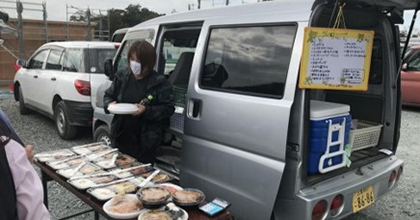Social contribution activities by employees and group companies
Policy/view
Our company considers volunteer activities to be: (i) “opportunities whereby employees are away from the organization called the company and can contact society or the area as individuals”; and (ii) important opportunities in which the employees who participate together build new human relations and broaden their minds through acting for mutual purposes beyond position, age, and gender. Our company also considers that the experience obtained there will bring new perspectives and a sense of value to the business.
This page explains the examples of the social contribution activities carried out by employees, field offices, group companies, etc.
Efforts and results of social contribution activities
One of the features of the construction industry is to “have offices in many areas of the world and form close links with such areas.” Our company is aware of being one of the residents and a corporate citizen, and field offices, groups, individuals, etc. are spontaneously conducting social contribution activities. Especially since the area can be considerably affected at a construction site, we aim to develop good communication with the local residents. Specifically, playing a role as a member of the area by preparing and participating in local events and cleaning the neighborhood, we are providing opportunities for the residents to deepen their interest and understanding in construction by holding site tours and publishing a construction newspaper. Also, at the time of a disaster, we conduct quick restoration activities and provide support.
These activities are registered in a database from each branch office and field office, and the entire company shares the information through the intranet. A total of 297 activities were registered in FY 2021. We are making efforts to activate activities further by commending especially excellent activities, among others, with the “Social and Regional Contribution Activities Encouragement Award.”
![Communications with the area: [KPI] Efforts for social and regional contribution activities](/assets/images/english/csr/sacca/sca/sca_img06.jpg)
Result
Contribution activities in the area with many elderly residents where severe damage occurred due to heavy rain
[Chojahara Construction Field Office, Tohoku Branch]
In August 2022, in the area where our field office dormitory is located in Oguni-machi, Yamagata Prefecture, heavy rain occurred where149.0 millimeters of rain fell in one hour, which was ranked sixth in the history of rainfall observation in Japan. The rainfall exceeded 560 millimeters, and due to this heavy rain, the adjacent river overflowed and the entire area around the dormitory was submerged.
After the heavy rain had subsided, we conducted post-disaster recovery activities in the area, such as removal of sediment, transportation of disaster refuse, and pulling out residents' submerged cars from garages, together with neighborhood residents. Most of residents in this area are elderly people. So, we were much appreciated by the residents and also received high evaluation from Oguni-machi and the orderer.
After that, the construction work at the field office was completed, but at other field offices as well, we will actively continue activities that are considerate of local residents in the future.
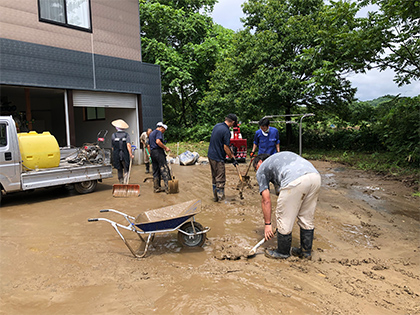
Clarification of social issues from the viewpoint of the local government or orderer and contribution to PR of the region
[Yoragawa Field Office, Tokyo Civil Engineering Works Branch]
This field office is constructing a new drainage pumping station at the Yoragawa River that flows into the Watarase Yusuichi (retarding basin) in a suburb of Oyama City located in the southern part of Tochigi Prefecture, as part of the government-managed farmland improvement project. In this area, flood damages have frequently occurred for many years. It is required that in the river basin flood control project in which the Ministry of Agriculture, Forestry and Fisheries which is an orderer participates, not only the government and local governments, but also local residents actively participate.
Therefore, our young employees in charge of civil engineering and clerical works issued on their own initiative the “Yoragawa Newsletter” every month for three years after the commencement of work (a total of 39 issues), which provided information about the state of the construction from the perspective of the sites so that local residents, who would operate the facility after its completion, could deepen their understanding of the farmland improvement project and the river basin flood control project. They then visited neighboring farmers, the elementary school, etc. door-to-door to distribute the newsletters. The newsletter started with the report on the status of the construction work, and then the contents were expanded with a variety of themes, focusing on the “development of a sustainable rural area,” such as the introduction of the environmental education by the local government and the Ministry of Agriculture, Forestry and Fisheries, the efforts on rural development, and the local culture in response to local people's requests for interviews.
Based on the spirit of giving the top priority to local areas, which our company has valued at sites for many years, we will continue our corporate activities rooted in the local community.
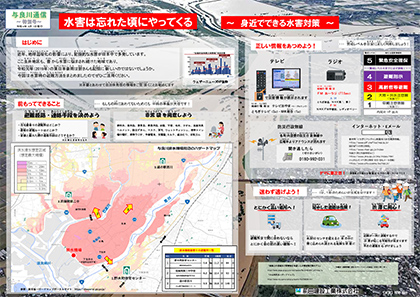
Adding creative design to a temporary fence to retain the openness of a nursery yard, and because it was favorably received, modifying the temporary fence into a permanent fence
[YB Nihon-matsu Field Office, Tohoku Branch]
Our field office is adjacent to a nursery. On a temporary fence erected on the border with the nursery, we put cute-illustrated sheets, and transparent boards through which the nursery children could see our work site. As a result, according to the nursery’s staff, the fence was favorably received as the children became interested in our heavy machinery, cranes and workmen working at elevation.
The nursery requested us to leave the fence after the construction work is completed. After discussing their request with the work owner, we modified the temporary fence to a permanent fence, and re-erected the lower part with newly installed whiteboards on which the children can draw paintings. The nursery’s staff were very pleased that the completed fence makes the garden look happier, and gives a sense of fun. The work owner also appreciated the fence modification as he took it as an opportunity to maintain the good relationship with the neighbors. This way, we were able to deepen the amicable relationship not only between our company and local people, but also between the work owner and those people. We will continue to seek activities that are considerate of neighbors in the future.
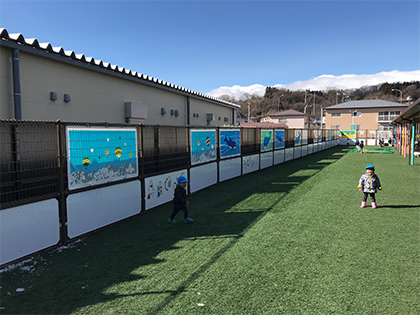
Social contribution activities through the hotel business and the building management business
[Hotel Cadenza Tokyo, J City, Inc.]
Our company has worked on initiatives in cooperation with Nerima Ward, Tokyo, as our social contribution activity that takes advantage of the contents of our businesses. For the Tokyo Olympics, we provided support for Nerima Ward’s “Host Town Exchange Program,” and provided accommodation to athlete teams from Denmark and Ecuador at our hotel. During their stay, we provided opportunities for interactions between the athletes and ward citizens, such as a celebration for their medal wins.
In addition, our hotel offers a suite and a banquet hall for free as the venue of a Nerima Children Café* program (conducted approximately once a month), which is sponsored by Nerima Ward, and has continued to offer a free self-study room for children who do not have such an environment for self-study in circumstances where public facilities such as schools and libraries were closed due to the COVID-19 pandemic, for almost two years. To date, a total of more than 150 pairs (300 people) have used the Nerima Children Café, and a total of over 1,000 people have used our self-study room. We have received many favorable comments from people who have used the café and self-study room.
In March 2022, we offered our facility called “Hikarigaoka Dome” to Nerima Ward for free as a third-vaccination site, and provided a free shuttle bus operated by our company for vaccine recipients.
Our company will continue to actively conduct such community-based activities while making use of our strengths.
* This is one of Nerima Ward’s parenting support programs intended to support families who are subject to isolation due to home parenting. The program provides sites and opportunities for the users to casually request childcare consultation, and for interactions between parents, by using a privately owned café and the like, rather than the ward’s facilities.
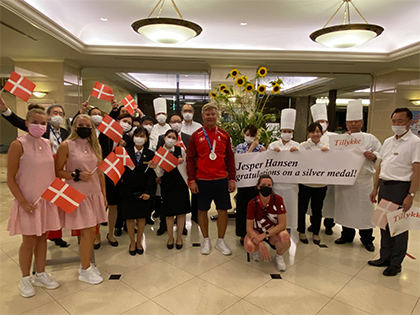
Making public and sharing a list of emergency articles stocked at the field office with the local people
[Hamasato WF Field Office, Hokkaido Branch Office]
The field office of this site is located in Toyotomi-cho, Teshio District, Hokkaido, with a population of approximately 3,800. Emergency supplies, such as drinking water, emergency food, and blankets, are usually stocked in the field office in case of the suspension of lifelines, including electricity, gas, and water at the time of accident due to earthquake, abnormal weather, and others.
There are many elderly people in the neighborhood association around this field office. Some people stopped at the notice board of the office on the site to look at it during their walk. Considering whether there was something we could do to help this depopulated town facing a rapidly aging society, with many elderly people living here, we created the stock list of emergency articles and posted it on the temporary fence, showing a place of contact. Although a situation where the list actually becomes useful should not occur, we would like to help the people by doing what little we can, hoping that the people will talk to us in case of emergency.
We will undertake more activities contributing to the region, valuing the communication with local residents.
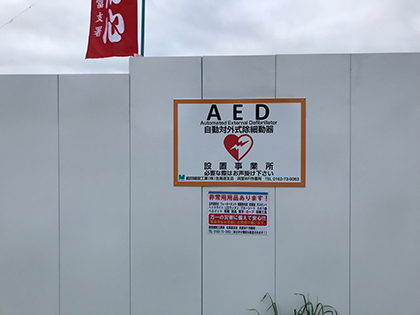
Cooperation in returning storks to the wild at Watarase Yusuichi
[Yoragawa Field Office, Tokyo Civil Engineering Works Branch]
This field office is in a suburb of Oyama City in the southern part of Tochigi Prefecture, located in a place surrounded by water, such as Yoragawa River and Watarase Yusuichi, and is constructing a new drainage pumping station as part of the project of government-managed farmland improvement.
After Watarase Yusuichi was registered under the Ramsar Convention on Wetlands in July 2012, Oyama City has been working on a “project for returning storks to the wild.” The city has been creating an environment hospitable to storks through installing artificial nest towers and promoting agriculture by reducing pesticides and chemical fertilizers.
The efforts in previous activities bore fruit, and two baby storks were born this year, following last year in which the first baby stork was born in Eastern Japan. Receiving a request from the city this year as well, this field office ensured a runway for a motor vehicle for “the work to attach rings for observation to the legs of baby storks” and operated a vehicle for high lift work to help the storks to evacuate from their nest tower. After experts attached the leg rings, the baby storks were safely returned to their nest, and the work was completed. The news of this work was reported, and many people, including local residents, got to know about the work. We will continue such community-based activities, valuing the communication with local residents.
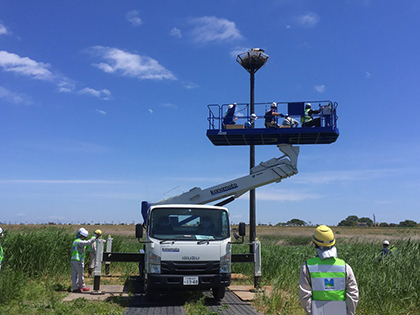
Approaching the restaurants affected by the COVID-19 crisis and selling box lunches to workers
[Aquaignis Taki Hotel Field Office, Chubu Branch]
For one of Japan’s largest commercial resort facilities, “VISON,” which will be newly born in Mie Prefecture, this field office was in charge of construction work for “Hotel VISON,” which is a lodging facility.
While proceeding with the construction, we heard from neighbors that restaurants in the neighborhood were currently having a hard time due to the request to shorten business hours and others amid the COVID-19 pandemic and considered whether there was something we could do to contribute to them. As cooperation for the neighborhood and efforts to improve the working environment of the workers engaged in construction work, we approached restaurants struggling with the difficult situation to sell box lunches to workers.
Two restaurants agreed on our plan and sold their box lunches on the working days of the construction site. While the number of workers was approximately 200 persons/day, as many as 75 to 100 box lunches were sold.
Since the site is vast, 24 times as large as Tokyo Dome, and the site is very far from the urban district, it was difficult for workers to ensure their lunch break. which was a problem. Therefore, we obtained a synergistic effect of contributing to the region suffering from the COVID-19 crisis and improving workers’ working environment. The situation remains unpredictable worldwide. We would like to continue to be rooted in the region and contribute to solving social problems.
